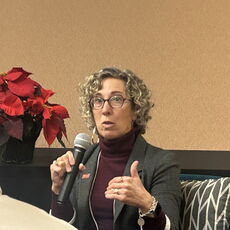
Processing Your Payment
Please do not leave this page until complete. This can take a few moments.
- News
-
Editions
-
- Lists
-
Viewpoints
-
Our Events
-
Event Info
- Women's Leadership Forum 2025
- On the Road with Mainebiz in Bethel
- Health Care Forum 2025
- On The Road with Mainebiz in Greenville
- On The Road with Mainebiz in Waterville
- Small Business Forum 2025
- Outstanding Women in Business Reception 2025
- On The Road with Mainebiz in Bath
- 60 Ideas in 60 Minutes Portland 2025
- 40 Under 40 Awards Reception 2025
- On The Road with Mainebiz in Lewiston / Auburn
- 60 Ideas in 60 Minutes Bangor 2025
Award Honorees
- 2025 Business Leaders of the Year
- 2024 Women to Watch Honorees
- 2024 Business Leaders of the Year
- 2023 NextUp: 40 Under 40 Honorees
- 2023 Women to Watch Honorees
- 2023 Business Leaders of the Year
- 2022 NextUp: 40 Under 40 Honorees
- 2022 Women to Watch Honorees
- 2022 Business Leaders of the Year
-
-
Calendar
-
Biz Marketplace
- News
- Editions
- Lists
- Viewpoints
-
Our Events
Event Info
- View all Events
- Women's Leadership Forum 2025
- On the Road with Mainebiz in Bethel
- Health Care Forum 2025
- On The Road with Mainebiz in Greenville
- On The Road with Mainebiz in Waterville
- + More
Award Honorees
- 2025 Business Leaders of the Year
- 2024 Women to Watch Honorees
- 2024 Business Leaders of the Year
- 2023 NextUp: 40 Under 40 Honorees
- 2023 Women to Watch Honorees
- 2023 Business Leaders of the Year
- + More
- 2022 NextUp: 40 Under 40 Honorees
- 2022 Women to Watch Honorees
- 2022 Business Leaders of the Year
- Nomination Forms
- Calendar
- Biz Marketplace
To counter anti-college sentiment, Maine higher education leaders give themselves some homework
 Photo / Renee Cordes
From left, Thomas College President Jeannine Diddle Uzzi; UNE President James Herbert; University of Maine System Chancellor Dannel Malloy; and Maine Community College System President David Daigler at Friday's Educate Maine symposium in Portland.
Photo / Renee Cordes
From left, Thomas College President Jeannine Diddle Uzzi; UNE President James Herbert; University of Maine System Chancellor Dannel Malloy; and Maine Community College System President David Daigler at Friday's Educate Maine symposium in Portland.
From better storytelling about the value of a college education to more nimble governance, there’s a lot that Maine colleges and universities can do to boost their appeal to learners of all ages and backgrounds, four industry leaders told a panel on Friday.
Noting today’s "anti-intellectual movement” in the United States, University of Maine Chancellor Dannel Malloy warned that “if we don’t counteract that, then the oldest state in the nation demographically is going to have fewer and fewer people who actually go to college.”
His pitch to learners: If you get a college degree, you will earn twice the average income of someone who didn’t, he said at the annual Educate Maine symposium in Portland.
Malloy was joined on a panel devoted to innovation in higher education by James Herbert, president of the University of New England; David Daigler, president of the Maine Community College System; and Jeannine Diddle Uzzi, a former provost of the University of Southern Maine who recently succeeded Laurie Lachance as president of Thomas College in Waterville.
More than 450 people attended the day-long symposium, which also featured sessions on career pathways in health care, clean energy and Maine’s burgeoning space sector, and integrating business mentoring in Maine schools. Lachance received an award for her work as an industry trailblazer.
'Relationships can work'
The higher education panel, moderated by Katie Shorey of Live + Work in Maine, was held amid research showing that close to 30% of Americans believe a college degree isn’t worth it, according to a Pew Research Center survey published earlier this year.

In Maine where enrollment is also down, Uzzi believes that “relationships can work” to get young people interested in pursuing a college education. She aims to do that by visiting K-12 schools to introduce herself and Thomas College to them “and be that inspiration.”
“We need to get into students’ imaginations,” and the way to do that is to get into classrooms, she said. “We just have to stay on the radar.”
On affordability, UNE’s Herbert noted that there are lots of myths around college being out of reach and urged families not just to consider the “sticker price,” but the actual cost after financial aid.
“There’s lots of options, and a college education is in reach for pretty much all Maine families,” he said. “You just have to be creative and know how to navigate the system.”
Broadening their reach
As to what institutions of higher learning can do better, Herbert suggested broadening their appeal to non-traditional applicants including those from rural backgrounds and young men and boys in particular where college enrollment is “falling off the cliff.”
At UNE, a new task force is looking at how the school can better signal to young men that there is a place for them at that school.
“We need to think more broadly about the belonging question,” Herbert said.
To appeal to non-traditional students “with complicated lives,” Maine’s community colleges offer short-term training connected to employment opportunities, according to Daigler, underscoring the need to accommodate learners throughout their careers and entire lives.
Long before that, faculty members will visit high schools to show students more interested in the trades than academia that there is a place for them at community colleges and the plethora of potential career opportunities available to them.
“Not all students want to sit in a classroom and want to study Kierkegaard,” he said. His suggestion for higher education as a whole is to break away from a traditional model that goes back 100 years and create “a broader range of options” for students to "gain traction in the economy."














0 Comments